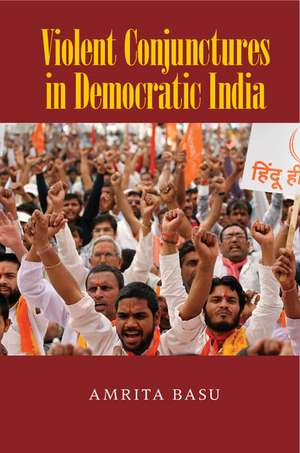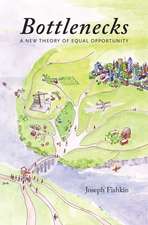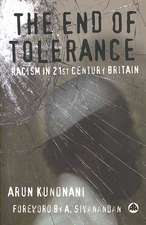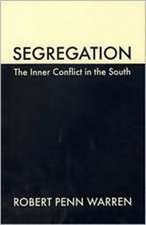Violent Conjunctures in Democratic India: Cambridge Studies in Contentious Politics
Autor Amrita Basuen Limba Engleză Paperback – iul 2015
| Toate formatele și edițiile | Preț | Express |
|---|---|---|
| Paperback (1) | 271.98 lei 6-8 săpt. | |
| Cambridge University Press – iul 2015 | 271.98 lei 6-8 săpt. | |
| Hardback (1) | 637.11 lei 6-8 săpt. | |
| Cambridge University Press – 29 iun 2015 | 637.11 lei 6-8 săpt. |
Din seria Cambridge Studies in Contentious Politics
-
 Preț: 178.72 lei
Preț: 178.72 lei -
 Preț: 162.90 lei
Preț: 162.90 lei -
 Preț: 197.42 lei
Preț: 197.42 lei - 9%
 Preț: 626.73 lei
Preț: 626.73 lei -
 Preț: 210.35 lei
Preț: 210.35 lei -
 Preț: 220.85 lei
Preț: 220.85 lei -
 Preț: 199.89 lei
Preț: 199.89 lei - 8%
 Preț: 564.60 lei
Preț: 564.60 lei -
 Preț: 289.10 lei
Preț: 289.10 lei -
 Preț: 238.15 lei
Preț: 238.15 lei -
 Preț: 232.48 lei
Preț: 232.48 lei -
 Preț: 160.00 lei
Preț: 160.00 lei -
 Preț: 203.50 lei
Preț: 203.50 lei -
 Preț: 231.38 lei
Preț: 231.38 lei -
 Preț: 263.79 lei
Preț: 263.79 lei -
 Preț: 274.27 lei
Preț: 274.27 lei -
 Preț: 227.61 lei
Preț: 227.61 lei - 11%
 Preț: 637.54 lei
Preț: 637.54 lei -
 Preț: 474.87 lei
Preț: 474.87 lei -
 Preț: 225.50 lei
Preț: 225.50 lei -
 Preț: 269.58 lei
Preț: 269.58 lei -
 Preț: 201.59 lei
Preț: 201.59 lei -
 Preț: 229.56 lei
Preț: 229.56 lei -
 Preț: 238.13 lei
Preț: 238.13 lei -
 Preț: 306.73 lei
Preț: 306.73 lei - 11%
 Preț: 553.62 lei
Preț: 553.62 lei - 11%
 Preț: 694.04 lei
Preț: 694.04 lei -
 Preț: 231.05 lei
Preț: 231.05 lei -
 Preț: 305.33 lei
Preț: 305.33 lei -
 Preț: 201.59 lei
Preț: 201.59 lei -
 Preț: 230.51 lei
Preț: 230.51 lei - 14%
 Preț: 791.97 lei
Preț: 791.97 lei - 11%
 Preț: 555.03 lei
Preț: 555.03 lei -
 Preț: 251.27 lei
Preț: 251.27 lei - 11%
 Preț: 554.68 lei
Preț: 554.68 lei - 11%
 Preț: 459.73 lei
Preț: 459.73 lei
Preț: 271.98 lei
Nou
Puncte Express: 408
Preț estimativ în valută:
52.04€ • 54.48$ • 43.06£
52.04€ • 54.48$ • 43.06£
Carte tipărită la comandă
Livrare economică 05-19 aprilie
Preluare comenzi: 021 569.72.76
Specificații
ISBN-13: 9781107461321
ISBN-10: 1107461324
Pagini: 357
Ilustrații: 9 b/w illus. 2 maps
Dimensiuni: 152 x 228 x 20 mm
Greutate: 0.5 kg
Editura: Cambridge University Press
Colecția Cambridge University Press
Seria Cambridge Studies in Contentious Politics
Locul publicării:New York, United States
ISBN-10: 1107461324
Pagini: 357
Ilustrații: 9 b/w illus. 2 maps
Dimensiuni: 152 x 228 x 20 mm
Greutate: 0.5 kg
Editura: Cambridge University Press
Colecția Cambridge University Press
Seria Cambridge Studies in Contentious Politics
Locul publicării:New York, United States
Cuprins
Introduction; Part I. The Pillars of Hindu Nationalism: 1. The state: dialectics of states, parties, and movements; 2. Party politics: disrupting party-movement boundaries; 3. Movements politics: globalized markets and sacred spaces; Part II. Extensive Violence: 4. When local violence is not merely local: a tale of two towns; 5. Gujarat: the perfect storm; Part III. Episodic Violence: 6. Uttar Pradesh: movements and counter movements; 7. Himachal Pradesh: the party rules; 8. Rajasthan: two phases of party-movement relations; 9. Conclusion.
Recenzii
'Amrita Basu's richly researched, theoretically informed and multifaceted study revisits the question of the relationship between Hindu nationalism and communal violence. It breaks new ground by its nuanced and detailed examination of the relationship among federal states, party and social movement organizations.' Susanne Hoeber Rudolph, William Benton Distinguished Service Professor of Political Science Emerita, and Lloyd I. Rudolph, Emeritus Professor of Political Science, University of Chicago
'This book presents a comprehensive picture of the Hindu nationalist movement in more than one way. Not only does it not separate its political façade, the BJP, from the rest of the 'Sangh Parivar' - that Amrita Basu pertinently analyzes in terms of a social movement - but it also does not insulate the electoral politics of the Hindutva forces from its use of communal violence whose facets (including the economic and caste-based ones) are deciphered via well-chosen case studies. The whole demonstration is administered with special references to four major states of India - UP, Gujarat, Rajasthan and HP - whose comparisons show unexpected variations.' Christophe Jaffrelot, Professor, King's College London and Sciences Po (Paris) and Research Director at the CNRS (Centre National de la Recherche Scientifique)
'Violent Conjunctures in Democratic India situates India's now-reigning party, the BJP, in a deeply illuminating comparative perspective. Through her analysis of four Indian states, Basu offers a revelatory treatment of the BJP's swings between 'moderation and militancy'. Elucidating the too-rarely-investigated conjunctures of social movements and political parties, Basu's work will be vital reading to Indianists and to students of global politics alike.' Mary Fainsod Katzenstein, Cornell University, New York
'Amrita Basu brings the eye of the political scientist to local realities and the eye of the anthropologist to aggregate national patterns in this remarkable study of ethnic violence in India in the last four decades. Her ability to shift roles, views, and scales sheds new light on why the steady role of democratic institutions in Indian politics has been accompanied by party-led violence against minorities of every type in India. This study sets new standards for our understanding of the mass politics of hate and will be an invaluable guide to social scientists, critical humanists, and public intellectuals working on the paradoxes of democracy anywhere in the world.' Arjun Appadurai, New York University
'This book should be read not only by those interested specifically in mobilization and social movements, but anyone who wants greater insight into the types of majoritarian politics that seem to be gaining momentum around the globe, most especially in democratic countries. Scholars of such topics will not find a single easy or simple answer to the difficult questions tackled in this book, but they can expect to find answers that actually explain.' Rina Verma Williams, Mobilization
'This book presents a comprehensive picture of the Hindu nationalist movement in more than one way. Not only does it not separate its political façade, the BJP, from the rest of the 'Sangh Parivar' - that Amrita Basu pertinently analyzes in terms of a social movement - but it also does not insulate the electoral politics of the Hindutva forces from its use of communal violence whose facets (including the economic and caste-based ones) are deciphered via well-chosen case studies. The whole demonstration is administered with special references to four major states of India - UP, Gujarat, Rajasthan and HP - whose comparisons show unexpected variations.' Christophe Jaffrelot, Professor, King's College London and Sciences Po (Paris) and Research Director at the CNRS (Centre National de la Recherche Scientifique)
'Violent Conjunctures in Democratic India situates India's now-reigning party, the BJP, in a deeply illuminating comparative perspective. Through her analysis of four Indian states, Basu offers a revelatory treatment of the BJP's swings between 'moderation and militancy'. Elucidating the too-rarely-investigated conjunctures of social movements and political parties, Basu's work will be vital reading to Indianists and to students of global politics alike.' Mary Fainsod Katzenstein, Cornell University, New York
'Amrita Basu brings the eye of the political scientist to local realities and the eye of the anthropologist to aggregate national patterns in this remarkable study of ethnic violence in India in the last four decades. Her ability to shift roles, views, and scales sheds new light on why the steady role of democratic institutions in Indian politics has been accompanied by party-led violence against minorities of every type in India. This study sets new standards for our understanding of the mass politics of hate and will be an invaluable guide to social scientists, critical humanists, and public intellectuals working on the paradoxes of democracy anywhere in the world.' Arjun Appadurai, New York University
'This book should be read not only by those interested specifically in mobilization and social movements, but anyone who wants greater insight into the types of majoritarian politics that seem to be gaining momentum around the globe, most especially in democratic countries. Scholars of such topics will not find a single easy or simple answer to the difficult questions tackled in this book, but they can expect to find answers that actually explain.' Rina Verma Williams, Mobilization
Notă biografică
Descriere
This study examines the political sources of violence against religious minorities in India.











